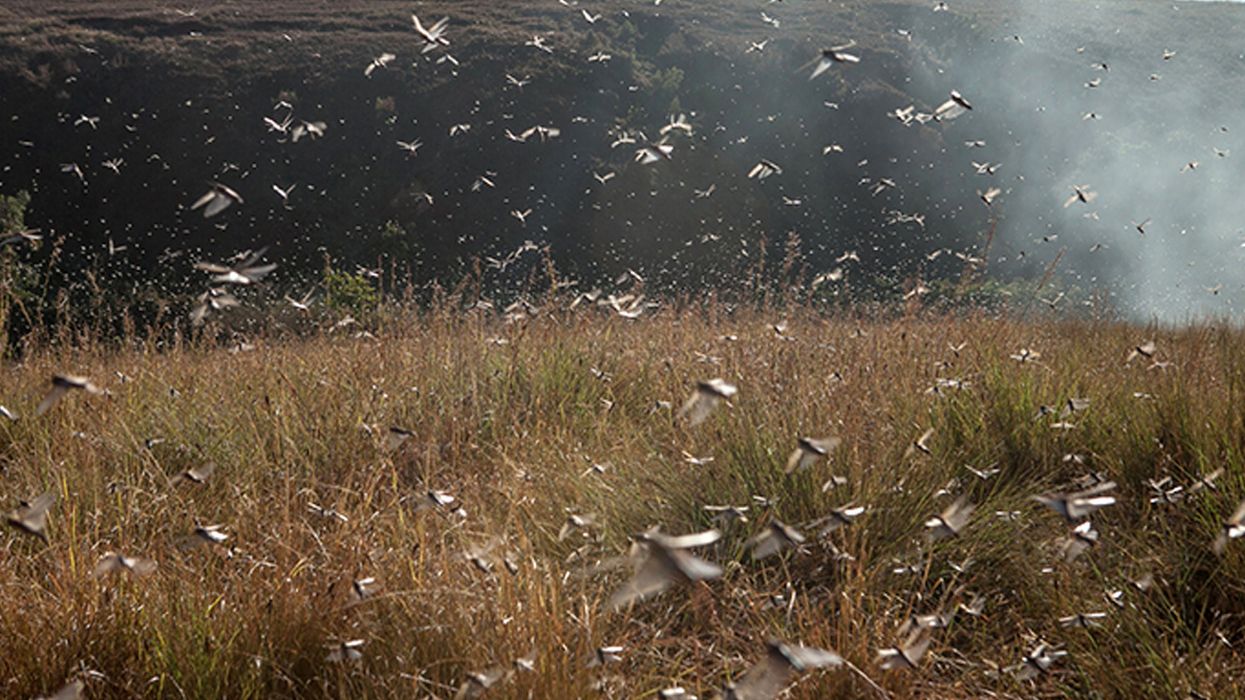
RIJASOLO/AFP/Getty Images

Huge swarms of locusts recently descended on Mecca — Islam's holiest site — filling the air and landing on worshippers. Special cleaning teams were brought in to drive out the insects, according to published reports.
Videos and pictures posted on social media show the bugs descending on the Great Mosque in Mecca, Saudi Arabia, where millions of Muslims gather every year.
One of the images shows the insects flying at night, illuminated by lighting from the mosque. They are also seen flying in every direction and landing on people. Another picture shows the locusts covering the walls of the mosque, the Daily Mail reported.
Clean-up crews were seen wearing face masks and spraying insecticide as they worked to sanitize the site. The scale of the infestation required 138 people working in 22 teams with 111 pieces of equipment to clean it up, according to reports. Most of the cleanup effort centered on breeding areas near open water drains.
Various reports called the bugs "black grasshoppers" or "night cockroaches." Some social media users asserted that they believe the locusts were "not" a message from God. Locust swarms are viewed as a divine punishment in Judaism, Christianity and Islam.
Newsweek reported that the locusts are primarily a nuisance:
While potentially a major nuisance, locusts themselves are not known to carry diseases transmittable to humans, nor do they bite or sting. Hazal bin Mohammed al-Zafar, the head of Plant Protection Department at King Saud University's Faculty of Food and Agricultural Sciences, told the local Sabq newspaper Monday that the "field cockroaches" were actually in the Gryllidae family, and actually more closely related to grasshoppers and crickets than domestic cockroaches.
Zafar told the outlet that locals should refrain from eating or selling the insects, while stressing that they "do not transmit diseases" and that swarming was a natural phenomenon, likely related to recent rains. He estimated that around 30,000 locusts had descended on Mecca, noting that larger swarms can reach into the hundreds of thousands.
#السعودية حشرات طائرة تهاجم الحرم في #مكة_المكرمة .....اللهم سلم سلم
pic.twitter.com/sJxDmpiCFx
— 🌸🐥Ď ó á á👀 Ě l go háry🐝🌼 (@Doaa_Jaheen8) January 8, 2019
{فَأَرْسَلْنَا عَلَيْهِمُ الطُّوفَانَ وَالْجَرَادَ وَالْقُمَّلَ وَالضَّفَادِعَ وَالدَّمَ آَيَاتٍ مُفَصَّلَاتٍ}.
حشرات بكميات كبيرة تجتاح ساحة الحرم، بعد ان اجتاحت مكة المكرمة وتسببت في تأجيل الدراسة!!
اليست هذه تنبيهات من الله لنا، كل هاذ بسبب ظلمنا وسكوتنا عن دماء أهل اليمن. pic.twitter.com/RpJoUaVXs8
— راشد الدوسري (@rashid88861) January 8, 2019